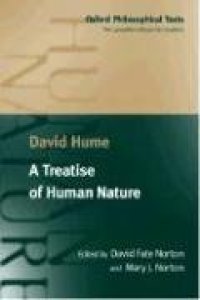
Ebook: A Treatise of Human Nature
Author: David Hume
- Genre: Education
- Series: Oxford Philosophical Texts
- Language: English
- pdf
I read this book for a graduate seminar on ethics. Hume's Treatise of Human Nature along with his staunch empirical approach to epistemology, has garnered him recognition as a "great skeptic" of the rationalist tradition in philosophy and recognition as the greatest philosopher to write in English. Hume's ethical project is concerned with discovering how people's nature dictates moral behavior and in discovering the moral virtues that society deems useful. Hume separates himself from the classical Greek notion of how an agent acts virtuously when he posits his thesis that people are incapable of using reason to sway their emotions or substantially influence their wills. "I shall endeavour to prove first, that reason alone can never be a motive to any action of the will; and secondly, that it can never oppose passion in the direction of the will." ((T, 2.3.3). Hume's theory regarding the process that agents use to act is a departure from the classical Greek model in that it relies on passion and is devoid of the idea of using practical reasoning to overcome feelings of fear to accomplish a noble end. For Hume, only a person's passions can choose their ends, and he denies that reason has the ability to evaluate their ends. (T, 3.1.1). Hume's notions on reason vastly contradicts the vast majority of ancient and modern philosophers' beliefs, regarding the amalgamation of human emotion and reason producing the practical reasoning to guide an agent to act.
Hume's anti-rationalist assertion that reason cannot be the major factor producing moral action provides the foundation for his entire ethical theory. In essence, Hume uses a causality argument to explain virtues and vices and what motivates people to make moral choices. Hume argues that what moves people are sentiments of pleasure, such as, pride or love, or pain, such as humility or hatred, as they either observe actions by others or contemplate performing acts of their own. "In every case, therefore, we must judge of the one by the other; and may pronounce any quality of the mind virtuous, which causes love or pride; and any one vicious, which causes hatred or humility." (T, 3. 3. 1). Hume adopts a subjective view to morality. He argues that one cannot use reason or science to deduce "truths" in ethics. Actions are deemed virtuous by a particular society through judgments of approval or distaste of people's sentiments when observing or contemplating a particular action. With this ethical model, Hume posits the notion that there are only two types of virtues, "natural" and "artificial," and that courage is a natural virtue since it brings the pleasurable sentiment of praise and pride to the one who acts courageously.
Hume leaves very little if any room for reason to either direct the people will, or even work in conjunction with people passions or emotions to form any kind of practical reasoning a person can rely on to guide them on a path to ethical behavior.
Hume's anti-rationalist assertion that reason cannot be the major factor producing moral action provides the foundation for his entire ethical theory. In essence, Hume uses a causality argument to explain virtues and vices and what motivates people to make moral choices. Hume argues that what moves people are sentiments of pleasure, such as, pride or love, or pain, such as humility or hatred, as they either observe actions by others or contemplate performing acts of their own. "In every case, therefore, we must judge of the one by the other; and may pronounce any quality of the mind virtuous, which causes love or pride; and any one vicious, which causes hatred or humility." (T, 3. 3. 1). Hume adopts a subjective view to morality. He argues that one cannot use reason or science to deduce "truths" in ethics. Actions are deemed virtuous by a particular society through judgments of approval or distaste of people's sentiments when observing or contemplating a particular action. With this ethical model, Hume posits the notion that there are only two types of virtues, "natural" and "artificial," and that courage is a natural virtue since it brings the pleasurable sentiment of praise and pride to the one who acts courageously.
Hume leaves very little if any room for reason to either direct the people will, or even work in conjunction with people passions or emotions to form any kind of practical reasoning a person can rely on to guide them on a path to ethical behavior.
Download the book A Treatise of Human Nature for free or read online
Continue reading on any device:

Last viewed books
Related books
{related-news}
Comments (0)